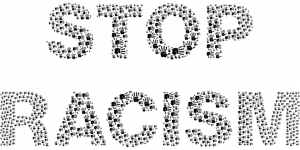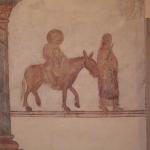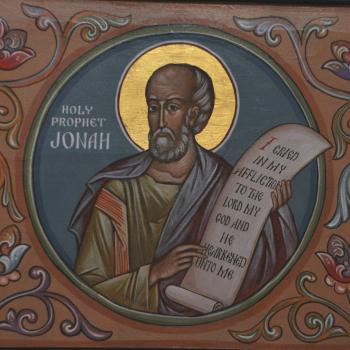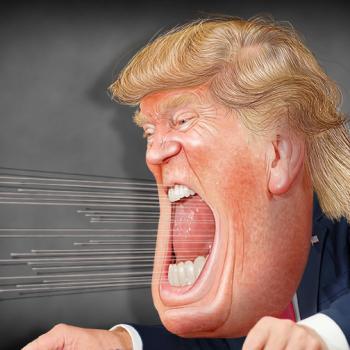On April 4, 2001, for the 33rd anniversary of the death of Martin Luther King Jr, Cardinal George released his pastoral letter on racism, Dwell in My Love, which he celebrated in 2011 with a 10th anniversary edition of the letter. Recognizing at the time that explicit forms of racism was readily condemned, Cardinal George pointed out that the influence and power of racism continued in four different forms:
In examining patterns of racism today, four forms of racism merit particular attention: spatial racism, institutional racism, internalized racism and individual racism.[1]
Spatial racism, according to him, was the way in which our built environment, our cities, are planned to often promote white privilege. Institutional racism is where such privilege is found promoted and reinforced in the traditions of our institutions. Internalized racism is how people see and understand each other through the lens of the dominant culture within society, not being allowed to have their own cultural heroes outside of those promoted by those with racial privilege. Lastly, individual racism promotes racist attitudes and stereotypes, sometimes consciously, sometimes unconsciously. All four forms of racism can be shown to work together, reinforcing each other. What is important for us to realize is how society as a whole creates the conditions for such racism, especially in and through various structures which govern and control society. This is where institutional racism comes into play, helping to reinforce and propagate racism:
Racism also finds institutional form. Patterns of social and racial superiority continue as long as no one asks why they should be taken for granted. People who assume, consciously or unconsciously, that white people are superior create and sustain institutions that privilege people like themselves and habitually ignore the contributions of other peoples and cultures. This “white privilege” often goes undetected because it has become internalized and integrated as part of one’s outlook on the world by custom, habit and tradition.[2]
While Cardinal George wrote against white privilege in the United States, and saw how it continued to promote and create various forms of racism, it is clear that the continued presence and power of racism within the United States allowed for the return of overt racism in the era of Donald Trump. Spatial, institutional, internalized, and individual forms of racism, because they have not been overcome, have come together to once again promote racist attitudes in society. Those who have received privilege from these forms of racism, like the President of the United States, not only continue to promote these forms of racism in an unconscious fashion, but promote their extension, allowing their own explicit racism at times come to the surface. We can see this in Trump’s recent tweets against Ilhan Omar, Ayanna Pressley, Alexandria Ocasio-Cortez, and Rashida Tlaib, telling them to go back to where they came from. Despite all of them being full citizens of the United States, despite three of them being natural born citizens who “come from the United States,” their racial status has allowed Trump to suggest they are not properly in the United States and should no longer be welcome.
What began as a campaign against the other – against immigrants – has quickly become a campaign against the other within the United States, against those who challenge Trump’s privilege. David Graham is right in saying, “By attacking the black and brown women of the squad, he is not just pitting citizen against immigrant, but citizen against citizen. This is a significant shift.”[3] It is, of course, a shift which was to be expected. Trump’s internalized racism would not be mollified by his abusive actions against immigrants. He, and his base, do not want to make America Great for everyone; rather, they want to return to old ways in which elites benefited at the expense of others, the America which, as John Blake explained, had no problem destroying those who were seen as inferior because of their race:
These two Americas have long co-existed.
One is the country represented by the Statue of Liberty, and its invitation to poor and tired immigrants “yearning to breathe free.”
The other is the one that virtually wiped out Native Americans, enslaved Africans, excluded Chinese immigrants in the late 19th century and put Japanese Americans in concentration camps.[4]
Catholics should know better; priests should not be promoting and applauding Trump’s supremacist attitudes and practices. Christ came to overturn the barriers which separated the people of the world from each other. Christians, as Pope Benedict XVI explained, are called to continue that work:
However, it also means crossing over barriers, over hatred, racism and the social and religious discrimination that divides and damages society as a whole. As St Paul affirms, Christians must first offer a luminous example in the quest for reconciliation and for communion in Christ, such that overcomes every kind of division.[5]
This means Christians not only are to face any xenophobia and racism by denouncing them for the sins which they are,[6] they are meant to stand in solidarity with those who are harmed by racist policies. The sacredness of human life is undermined when racism is either accepted, or left unconfronted. Thus, Pope Francis said that it should be an important part of the leaders of all religion to work together to overturn this blight on society:
In the face of the spread of new forms of xenophobia and racism, the leaders of all religions also have an important mission: that of spreading among the faithful the ethical principles and values inscribed by God on the heart of man, known as the natural moral law. It is about making and inspiring gestures which can contribute to building up societies founded on the principal of the sacredness of human life and on respect for the dignity of each person, on charity, on fraternity — which goes well beyond tolerance — and on solidarity. [7]
In declaring this, Pope Francis was following his predecessor, St. John Paul II:
In order that the very existence of brotherhood and human solidarity may be made possible, and still more so that their Christian dimension may be more intensely developed, the elementary values which underlie them have to be given recognition. Permit me here to recall certain of these: respect for others, a willingness to dialogue, justice, healthy ethics in personal and community living, freedom, equality, peace in unity, promotion of the dignity of the human person, the capacity to share and to divine with others. Brotherhood and solidarity rise above all clannish and corporation spirit, all nationalism, all racism, every abuse of power, every individual fanaticism, be it cultural or religious.[8]
Catholics must look to the common good. They must stand with those unjustly oppressed by racist ideologies and policies. They must speak up against Donald Trump and his constant embrace of supremacist ideologies. The supremacists get it, which is why they continue to applaud what he is doing. What was once hidden has now come to light.
Racism remains a dark and deadly power in the United States.
It is not only time to take a stand, it has been long past time to take a stand. Because the people of the United States, because its religious leaders, because its religious adherents have been distracted, the dark underbelly of America’s racist past has returned and shown itself in power. It cannot be allowed to remain.
[1] Cardinal Francis George, “Dwelling in My Love: A Pastoral Letter on Racism” (4-4-2001), 12.
[2] Cardinal Francis George, “Dwelling in My Love: A Pastoral Letter on Racism” (4-4-2001), 13.
[3] David A. Graham, “Trump Goes All In On Racism” in The Atlantic (7-105-2019).
[4] John Blake, “There’s a Sobering Truth to Trump’s Racist Tweets That We Don’t Like to Admit.” CNN (7-15-2019).
[5] Pope Benedict XVI, Homily on the Feast of the Conversion of St. Paul. Vatican Translation (1-25-2013).
[6] “Racism is a sin: a sin that divides the human family, blots out the image of God among specific members of that family, and violates the fundamental human dignity of those called to be children of the same Father. Racism is the sin that says some human beings are inherently superior and others essentially inferior because of races,” USCCB, “Brothers and Sisters to Us. US Catholic Bishops Pastoral Letter on Racism 1979.”
[7] Pope Francis, “To the Participants at the World Conference on ‘Xenophobia, Racism, And Populist Nationalism’ in Context of Global Migration.” Vatican Translation. (9-20-2018).
[8] St. John Paul II, “Message for the 22nd World Communications Day.” Vatican Translation (5-15-1988).
Stay in touch! Like A Little Bit of Nothing on Facebook.
If you liked what you read, please consider sharing it with your friends and family!














